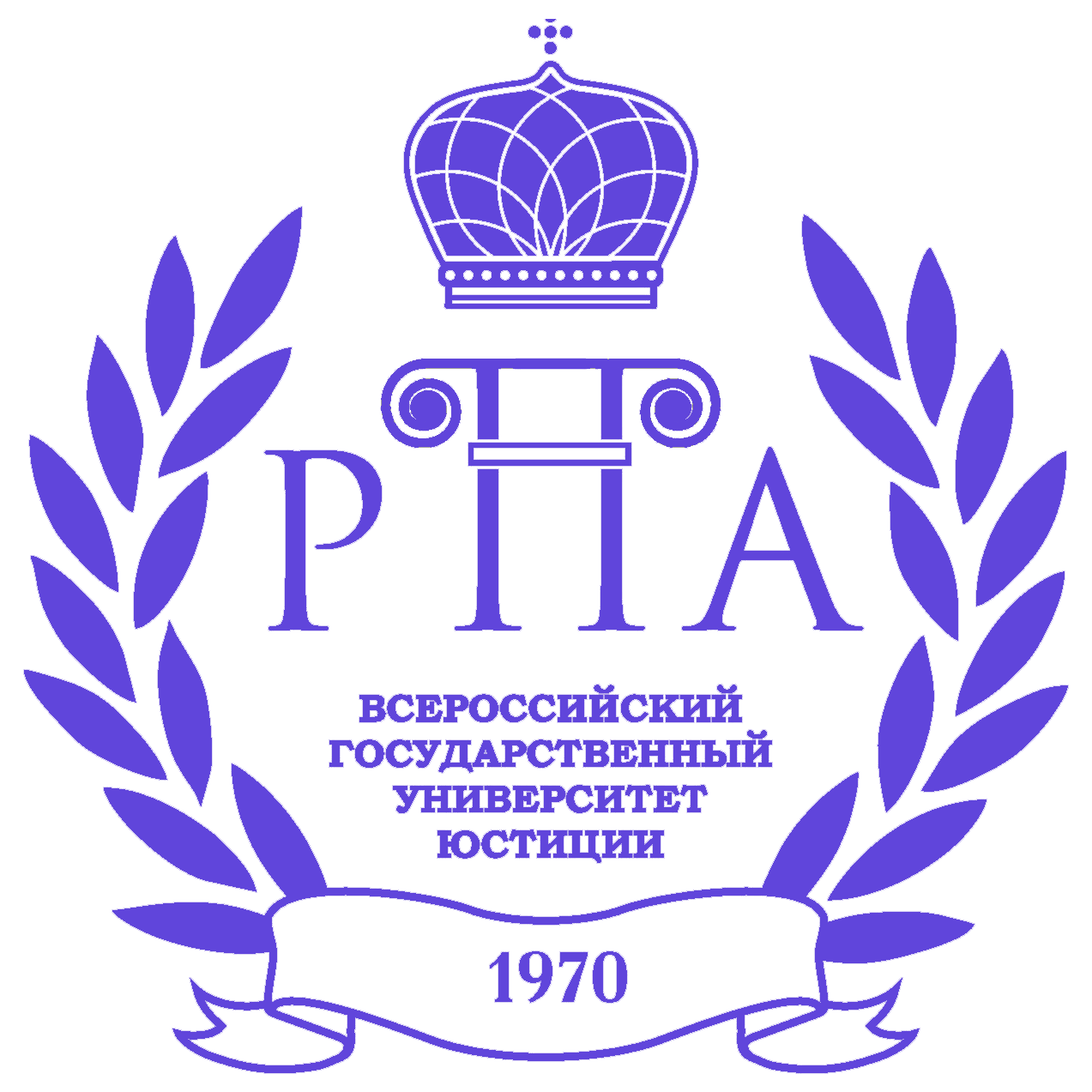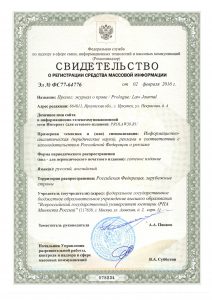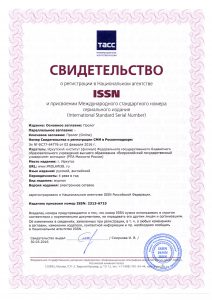THE RULES OF SUBMISSION, REVIEWING AND PUBLICATION OF SCIENTIFIC ARTICLES IN THE ONLINE SCIENTIFIC EDITION «PROLOGUE: LAW JOURNAL»
- The online scientific edition «Prologue: Law Journal» (hereinafter called the online edition) publishes scientific articles and reviews on the group of scientific specialties «Jurisprudence», prepared on the basis of original scientific researches.
- The online edition accepts articles by candidates and doctors of sciences from among the teaching staff of educational organizations, researchers, postgraduates, applicants for academic degrees, practitioners in order to provide scientists and practitioners with the opportunity to promptly publish the results of scientific research in the field of law, subject to high-quality and prompt review of manuscripts. Articles prepared by students and (or) undergraduates or in collaboration with students and (or) undergraduates are not accepted for publication.
- The requirements for publications in the online edition are formulated taking into account the requirements for peer-reviewed scientific publications, in which the main scientific results of dissertations for the degree of candidate of sciences, for the degree of doctor of sciences should be published.
- When publishing an article in the online edition, the authors express consent to the following:
— authors retain copyright and grant the journal the right of first publication of the work, which in 6 months after publication is automatically licensed under the terms of Creative Commons Attribution License, which allows others to distribute this work with the obligatory preservation of references to authors of the original work and the original publication in this journal;
— authors have the right to post their work on the Internet (for example, depository libraries or a personal website) prior to and during the journal`s reviewing process, as it can lead to fruitful discussions and more references to this work (See. The Effect of Open Access);
— authors accept the regulations of the Budapest Open Access Initiative (Budapest Open Access Initiative).
- Authors should send to the editorship (prolaw38@mail.ru):
— the application for publishing an article addressed to the editor-in-chief in accordance with the specimen posted on the website http://prolaw38.ru/;
— an electronic version of the article prepared in accordance with the requirements for the design of articles posted on the website http://prolaw38.ru/;
— information about an author (authors) according to the form posted on the website http://prolaw38.ru/.
- The article provided for publication must be carefully proofread, have scientific novelty, contain a statement of tasks (problems), a description of the main results of the study, the conclusions obtained, as well as meet the requirements for the design of articles posted on the website of the online edition.
- Articles sent by authors to other editions and / or published earlier will not be accepted for reviewing and publication.
- The fee for the publication of manuscripts in the journal is not charged.
- Information about authors submitted to the editorial office of the online edition cannot be transferred to other persons and organizations.
- The editorial board of the journal registers the materials received at the e-mail address of the journal prolaw38@mail.ru , and within 7 days sends the author a notification of the received article.
- In case of non-compliance of the article with the subject of the journal or the established requirements, the editorial board may reject the article before the review stage.
- The editorial board determines the compliance of the article with the scientific profile of the publication, the established design requirements, and also reveals the degree of its originality. The submission of the manuscript for the organization of peer review is made provided that the index of the originality of the article based on the results of the anti-plagiarism check is at least 70%.
- Before sending for review, the editorial board has the right to carry out scientific and literary editing of the received materials, if necessary, shorten them in agreement with the authors or send the articles for revision to the authors if the subject and content of the article is of interest to the online edition.
- The online edition carries out a review of all materials received by the editorial office that correspond to its subject matter, for the purpose of their expert evaluation. The editorial office organizes a double-blind review of all incoming manuscripts according to the principle «the author is unknown to the reviewer, the reviewer is unknown to the author». One review is enough to continue working with the article or to make a decision on its rejection. When receiving reviews from two or more reviewers, all received reviews are taken into account. The reviews are kept in the editorial office of the online publication for 5 years.
- All reviewers are recognized experts on the subject of peer-reviewed materials. The editor-in-chief, deputy editor-in-chief or executive secretary sends the article for review to a member of the editorial board who oversees the relevant scientific specialties and has had publications on the subject of the article for the last 3 years (internal review). In the absence of a member of the editorial board who meets these requirements, or upon receipt of an article from a member of the editorial board, the editor-in-chief, deputy editor-in-chief or executive secretary on behalf of the editorial board sends the article for review to specialists in the relevant branch of law, a doctor or candidate of sciences who has scientific work on the problems stated in the article for the last 3 years (external review).
- The terms of reviewing in each individual case are determined by the editor-in-chief (deputy editor-in-chief) and based on the creation of conditions for the most rapid publication of the article, but should not exceed one month.
- The review should cover the following issues:
(a) the degree to which the content of the article corresponds to the topic stated in the title;
(b) relevance, scientific novelty, expediency of the publication of the article in the light of the previously published literature on this;
(c) completeness of the disclosure of the topic (fully disclosed, partially disclosed, not disclosed);
(d) the degree to the scientific style of presentation and the requirements for the design of the scientific reference apparatus;
(e) positive aspects and disadvantages of the article;
(f) The quality of the conclusions drawn;
(g) the presence or absence of facts of duplication of materials, signs of plagiarism or falsification of data;
(h) the conclusion on the possibility of publishing the article: «recommended», «recommended with the corrections of the shortcomings noted by the reviewer » or «not recommended».
- The signed review is sent to the editorial office of the online magazine.
- The editorial board of the online publication sends the authors of the submitted materials copies of reviews in electronic form without specifying the data about the reviewer or a reasoned refusal.
- The presence of a positive review is not a sufficient reason for the publication of the article – the final decision on the publication of the article is made by the editorial board. In case of a positive review and a decision on publication, a corresponding letter is sent to the authors with an indication of the publication dates.
In case of receiving a review on the recommendation of an article for publication containing suggestions for improving the article or a review recommending the article for publication, subject to correction of deficiencies, the authors are invited to revise the manuscript in accordance with the comments of the reviewer and submit an updated version to the editorial board. In this case, the editorial board informs the authors about the need to finalize the manuscript. If the authors agree with the comments or suggestions of the reviewer, they undertake to make changes within 2 weeks and send the corrected version to the editorial office.
In case of disagreement with the reviewer’s comments, suggestions for eliminating shortcomings, the authors have the right to send a reasoned response to the editorial office with arguments about the comments received, which is considered by the members of the editorial board, after which a decision is made to send the text of the article for re-reviewing to another reviewer.
If the reviews are negative, a rejection letter is sent to the authors and the manuscript is archived.
An article not recommended by the reviewer for publication is accepted for reconsideration only if it is substantially revised taking into account the reviewer’s comments and sent for re-review to the reviewer who did not recommend the original version of the article for publication or to other reviewers who meet the requirements specified in paragraph 14 of these Rules. If the editorial board comes to the conclusion that the condition for the elimination of deficiencies is not properly fulfilled by the author, the editorial board refuses the author to continue working with the text of the article, including the refusal to organize a review. The editorial board also reserves the right not to accept for reconsideration articles in the original version of which the facts of plagiarism, incorrect borrowings and falsifications were reliably established.
- The editorial board reserves the right not to enter into a discussion of the results of the review with the authors of articles, reviewers and third parties.
- The editorial board of the online publication sends copies of reviews to the Ministry of Science and Higher Education of the Russian Federation upon receipt the relevant request to the editorial office.
Editor-in-chief of the scientific publication
«Prologue: Journal of Law / Prologue: Law Journal»
I. M. Sereda












